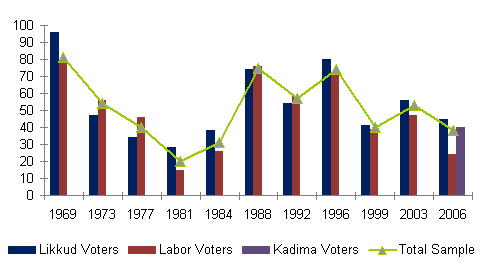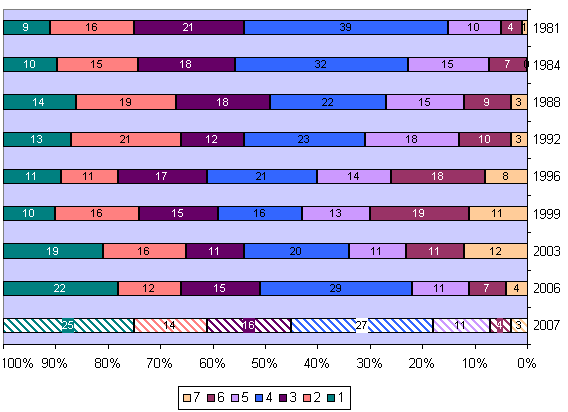Doves and Hawks in Israeli Society: Stances on National Security
How central is the question of national security among the general Israeli public, and to what extent is it central in the eyes of Israel's political parties? What are the estimated percentages of citizens in Israel who associate themselves with the right and left camps? This article by Yael Hadar, Naomi Himeyn-Raisch, and Anna Knafelman explores these questions, and associates Israel's right and left political camps with their perceptions of security-related issues, creating a "Dove-Hawk" axis in Israeli society.
Introduction
National Security has always been one of the most burning issues in Israel. The state of Israel was founded in war, and, ever since, it has been oscillating between tension and hope. The notion of an “existential threat” hovering over the new state was embedded into Israeli discourse already in the days of Ben-Gurion and has yet to subside. The significance of national security can be ascertained when examining several key aspects of Israeli society:
- Economy – The defense budget has always been very large, and 2008 is no exception. The government wishes to allocate 51.3 billion NIS to the Ministry of Defense, which constitutes 17.8% of the budget, and is the equivalent of 8% of Israel's GDP. In comparison, developed countries spend an average of 1–3% of their GDP on defense, and the United States spends 4%, which is considered very high. Even so, it should be noted that defense-related expenditures are on a steady decline, from 36% in 1976, to an average of 8–9% in the past decade.
- Law – The notion of a constant security threat is confirmed not only by the allocation of budgetary resources, but also by Israeli law, which has ruled that Israel is currently in a state of emergency (Basic Law: The Government). This ongoing legal status allows the authorities much lee way in limiting personal freedom, which otherwise would not have been possible. For example, due to the existing state of emergency, the government has the authority to make emergency decrees, thus overriding or altering any preexisting laws, except laws which are specifically protected from this kind of change. In addition, the Minister of Defense can order the incarceration of suspects for up to six months, without proof of committing a felony. Under the Defense (Emergency) Regulations, 1945, the authorities can also seize, confiscate, and search private property, censor, deny the use of vehicles, demolish homes, declare curfews, and more.
- Society – Because of the compulsory draft, a sizable portion of Israel's citizens are soldiers – in the past, present, or future. Shared military experiences shape Israeli society, and provide it with unique social networks, language, ethos, and myths. The compulsory service also brings the security threats to many homes which otherwise would have been free of them.
- Politics – Israeli politics also demonstrate the centrality of national security. The issue of the territories (after the 1967 war) intensified the discord between doves and hawks, which has become the main cleavage separating right from left in Israeli politics, and set security issues as the focal point of Israeli voting patterns.
The Perception of Security in Israeli Society
As opposed to the public sphere, the issue of national security is not necessarily the most significant issue for the individual Israeli citizen. The significance of security issues to Israelis fluctuates in accordance with current affairs, such as the peace process. In 1999 there was a decline in the significance of national security, and a similar decline has been constant since 2003, probably due to the relative calm. Note, though, that the second Lebanon war of 2006 and the rise of Hamas to power in the Gaza strip did not lead to a renewed interest in national security, as one may have expected. (Figure 1)
Figure 1 shows the differences in the centrality of national security as the single most important issue on the national agenda, between the voters of the Labor, Likud, and Kadima parties. It should be noted that up until 1977, Labor voters saw the security issue as more central than Likud voters. But after the Likud first took power in 1977, the perception of its voters regarding national security issues changed. In 2003, after the second Intifada, the centrality of security issues rose among Labor and Likud voters, and in 2006, before the second Lebanon war, national security was less significant in the eyes of voters of all three parties'. Likud voters were more interested in national security than Kadima and Labor voters, and Labor voters can be identified as interested in socio-economic issues more than ever before.
Figure 1 The Most Important Issues the Government Should Address: Security Problems 1969—2006, by Party Voters: Likud, Kadima, and Labor (Among the Jewish population; in percentages)

Left, Right, and Left: The “Dove – Hawk” Axis
Despite fluctuation in public view of the importance of national security, party politics in Israel has always seen it as the central and single most vital issue on its agenda. The division between political left and right is primarily dependant on opinions regarding national security, and especially the question of the territories. The accepted distinction between the Knesset's doves and hawks relies on the MKs' willingness to make territorial concessions, or lack thereof. Indeed, this is one of the main unresolved issues in Israeli politics, and ever since 1967, governments have been unable to follow through on any single consistent policy, thus resolving the issue. That the question of the territories remains pending is well reflected in the views of the public, which is similarly divided along these lines.
Even though the public's views on the issue of the territories vary, the Israeli public itself has remained divided on this question, which has made resolving the matter difficult for the political echelon. In the years 1973–1989 there was a consistent increase in the number of those willing to make territorial concessions, but those changes in position were influenced by current affairs, and the trends are therefore not linear. The increase in the public's willingness to make concessions matched the views of the political parties, and the latter began moving more to the Left.
In 2007, 46%, almost one-half of the Israeli public, believed that settlements should not be evacuated as part of a future peace agreement, 54% expressed willingness to make some sort of territorial concession. Of the latter, 16% are willing to concede a small portion of the territories, 16% are willing to concede part of the territories, 9% almost all of the territories, and 12% are prepared to give up on all of the territories.
Although the public's view and the political echelon lean slightly to the Left, this is not necessarily how the public sees itself. In fact, 52% of the population defined themselves as rightists; of them, 25% saw themselves as belonging to the extreme Right. Twenty-six percent saw themselves as centrists, and 22% defined themselves as leftist; of them, 7% saw themselves as belonging to the extreme Left. In 1981, 46% of the population saw themselves as rightists; of them, 9% as belonging to the extreme Right. Thirty-nine percent saw themselves as centrists and 15% as leftists; of them, 1% as belonging to the extreme Left.
Figure 2 Self-Positioning on the Right—Left Axis, 1981—2006 1=Right, 7=Left (Among the Jewish population; in percentages)

Characterizing the Camps
Who is willing to forfeit territory occupied in 1967 in order to achieve peace? Of those who positioned themselves on the left side of the Right—Left axis (5-7), 45% are willing to forfeit almost all or all of the territories as part of a peace agreement, as opposed to 11% of those who positioned themselves on the right side of the axis (1-3). Of those who define themselves as secular, 19% are prepared to evacuate almost all or all of the land as part of a peace agreement, as opposed to 10% of those who see themselves as traditional, 4% of the religious, and 0% of the ultra-Orthodox.
And which Israelis are willing to forfeit only a small portion of the territories, or none at all? Seventy-six percent of rightists and 34% of leftists gave these answers. Among secular Israelis, 63% are willing to forfeit only a small portion of the territories, or none at all, as opposed to 75% of traditional Israelis, 90% of religious Israelis, and 94% of ultra-Orthodox Israelis. One could point out the obvious correlation between levels of religiosity of those polled, their political stances, and their willingness to endorse the evacuation of settlements. In this case, we are exposed to one of Israeli society's most interesting phenomena – congruent cleavages, which divide between one social group and other groups on more than one issue.
Zisser and Cohen (2003) pointed out the difficulties which stem from congruent cleavages, and claimed that the existence of such cleavages lower the probability of agreement or compromise. The above congruence developed following the 1967 war, with the founding of Gush Emunim. The traditional link between Ha'Mizrachi and Mapai was broken, and the Mafdal joined the Right, and decided to concentrate its main political effort on settling the territories, and not on religion. Thus, under the Netanyahu government of 1996–1999, the Mafdal concentrated on rebuffing the Oslo accords, and not on religious aspects of government activity. Another indication of the congruent cleavages phenomena is the forming of new rightwing political parties, such as Moledet and T'hiya which relied mainly on religious voters, despite the fact that they were not officially religious. On the other side of the political spectrum, Meretz strives to combine the ideology of the Left with secularism, by attempting to separate religion from state. The situation in the ultra-Orthodox camp is more complex, but, even so, in recent years, rightwing political tendencies are becoming apparent.
The congruence of several cleavages, and the clear-cut partition of Israeli society into factions divided by more than one central issue, intensifies social discord and reduces the chance of compromise. Common denominators become fewer, and any social concession is perceived as an existential threat to the desirable identity of the country, as they see it. The balance between the social groups affects the ability of the political echelon to maintain contractual politics, which, in the past, was the basis for the many agreements between religious and secular groups. More recently, Israel has developed patterns of crisis politics, in which the government often prefers confrontational decisiveness rather than agreements, and the public also shows less willingness for major compromise (Zisser and Cohen, 2003:83-88).
Conclusion
According to Maslow's Pyramid of human social needs, the feeling of (physical and economic) security is second only to existential biological necessities. Indeed the need for personal security is central not only to individuals, but to the existence of states as well, which is justified, according to Rousseau’s The Social Contract, by the fact that it provides its citizens with security. Therefore, the constant debate regarding national security, especially in light of Israel's instability in this area, reflects the public's attitude towards security as a commodity which the state must provide. Throughout the years, the political parties have lined up on the Left—Right axis according to the way they choose to deal with the main issue that occupies Israelis, and voters have likewise grouped themselves on both sides of the fence. The balance of power has not contributed to the process of policy and decision making, and the government often decided not to decide.
Despite the public's alignment according to views on national security, it is not always perceived as the main problem on-hand, depending on the situation of national security at any given time. In the past few years, the topic of security has become less important to Israelis, who now choose to focus more on socio-economic issues, education, and the environment. Even so, these “new” topics have not replaced national security as the main cleavage which affects voting patterns and party behavior.
